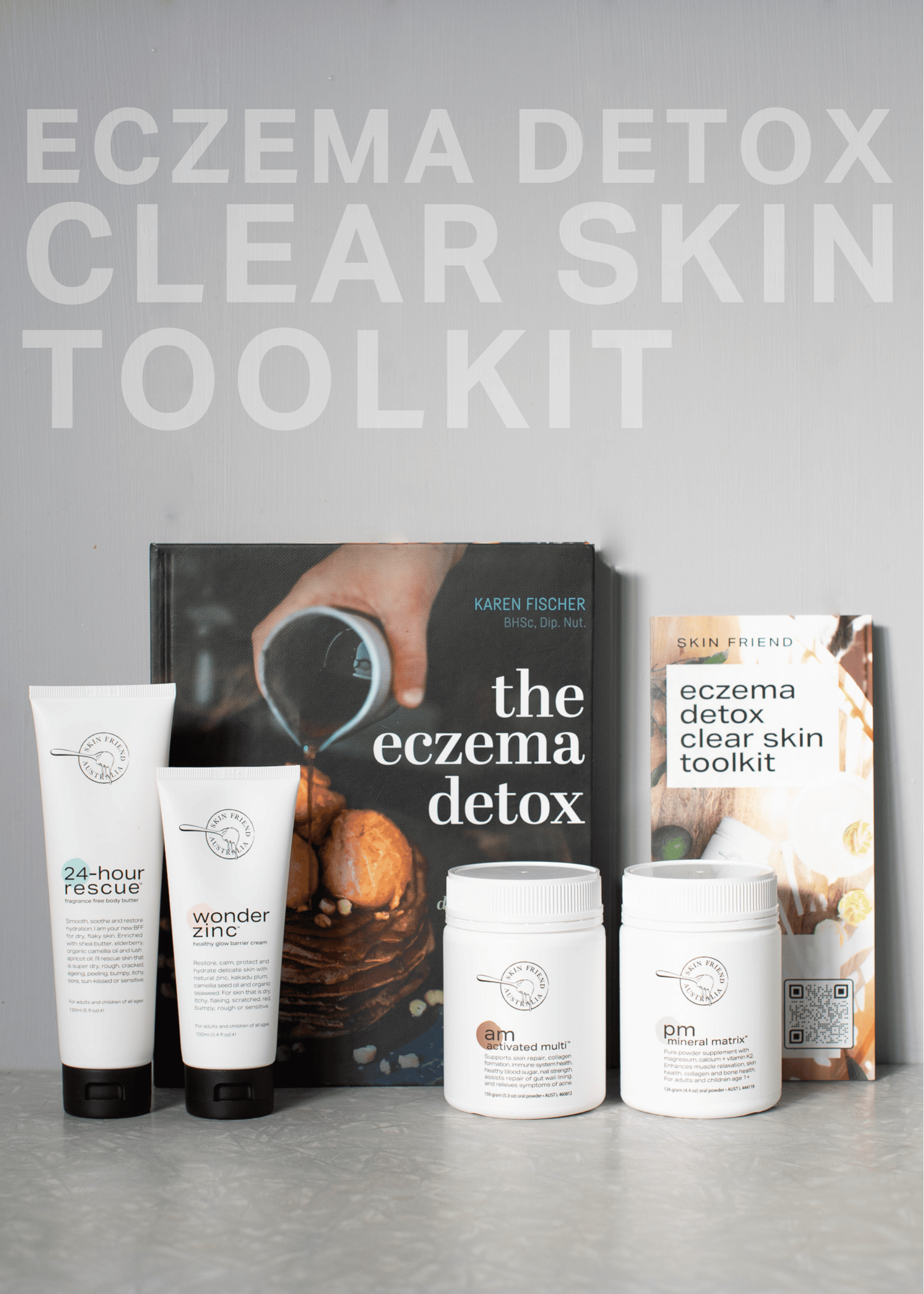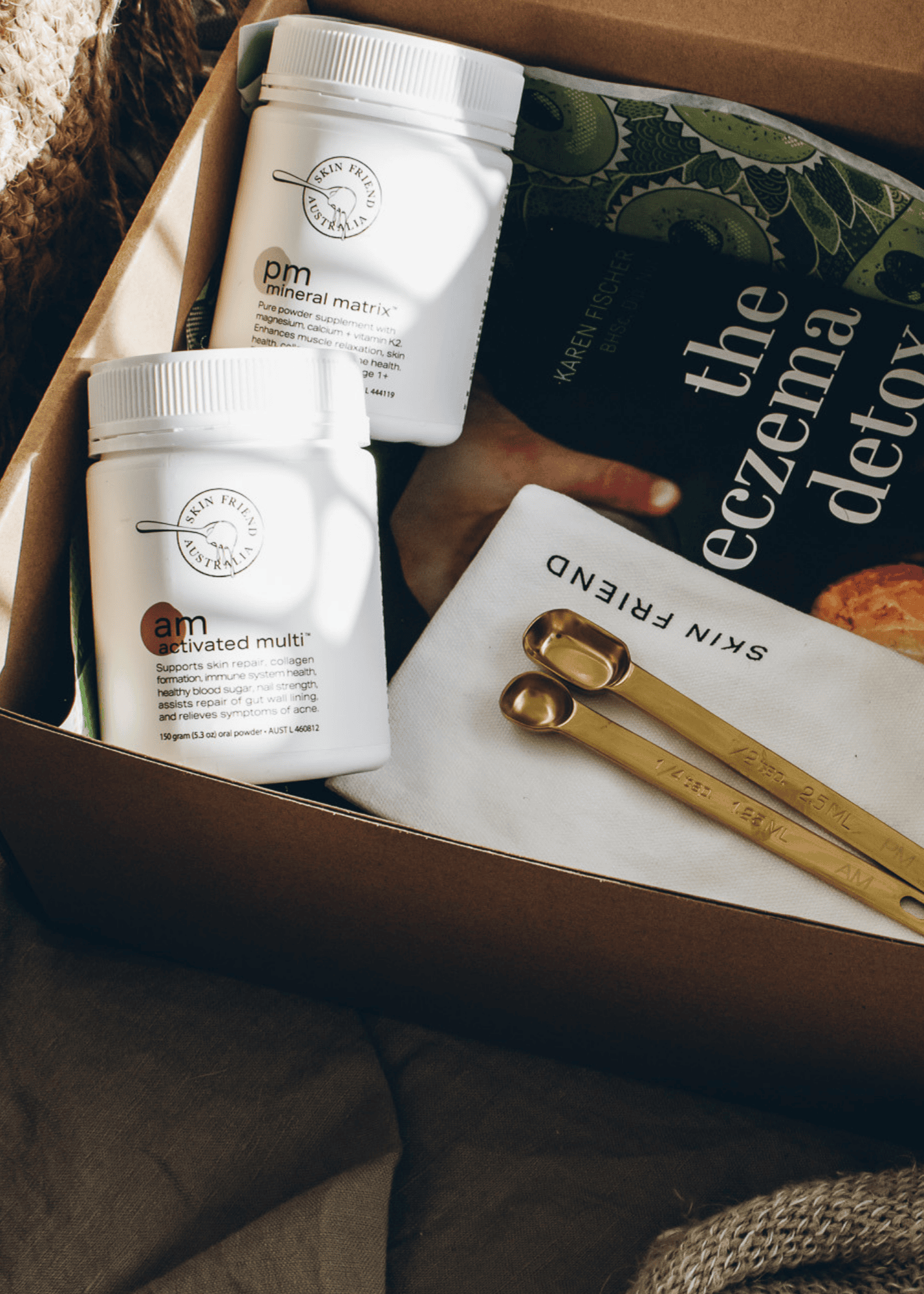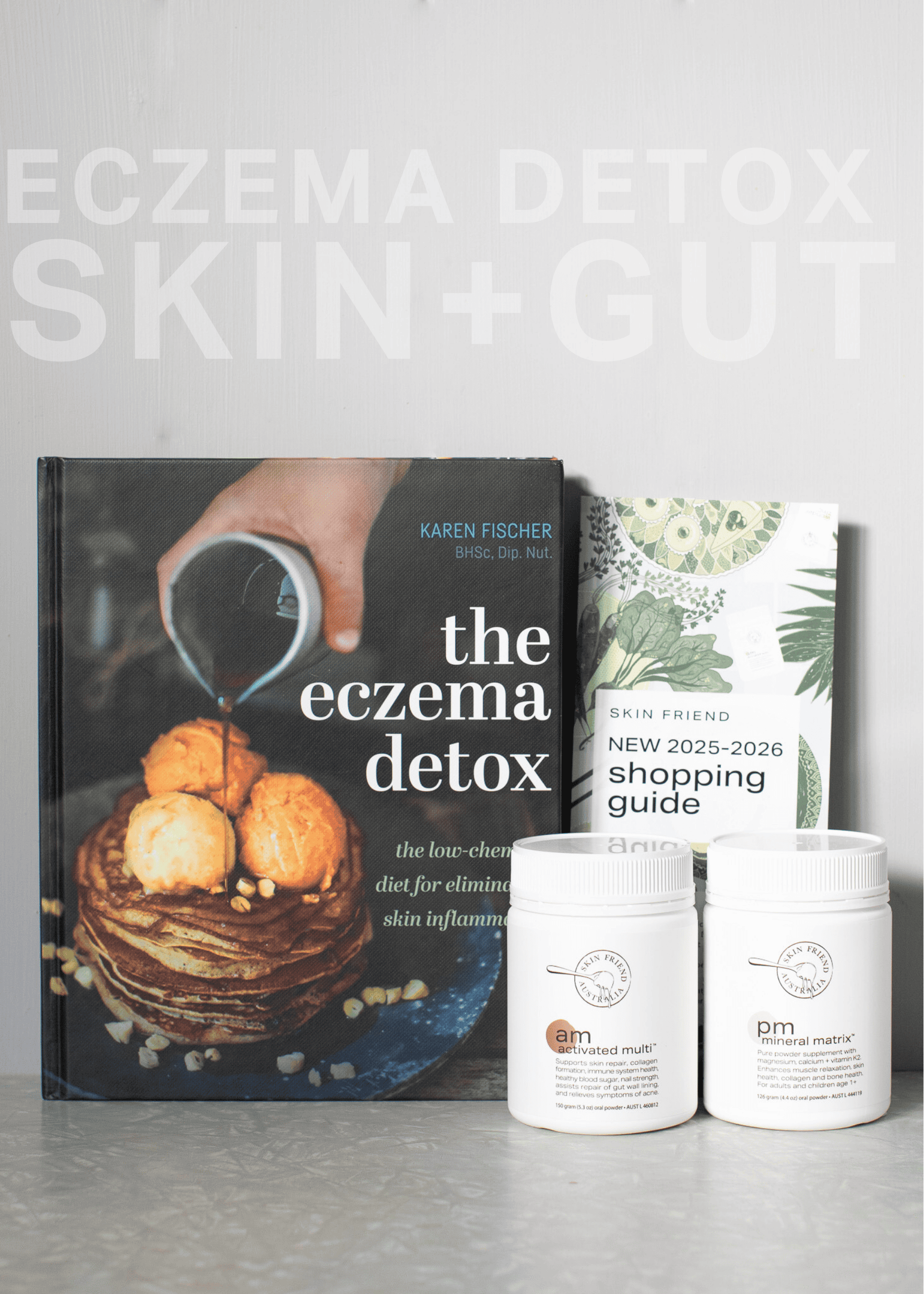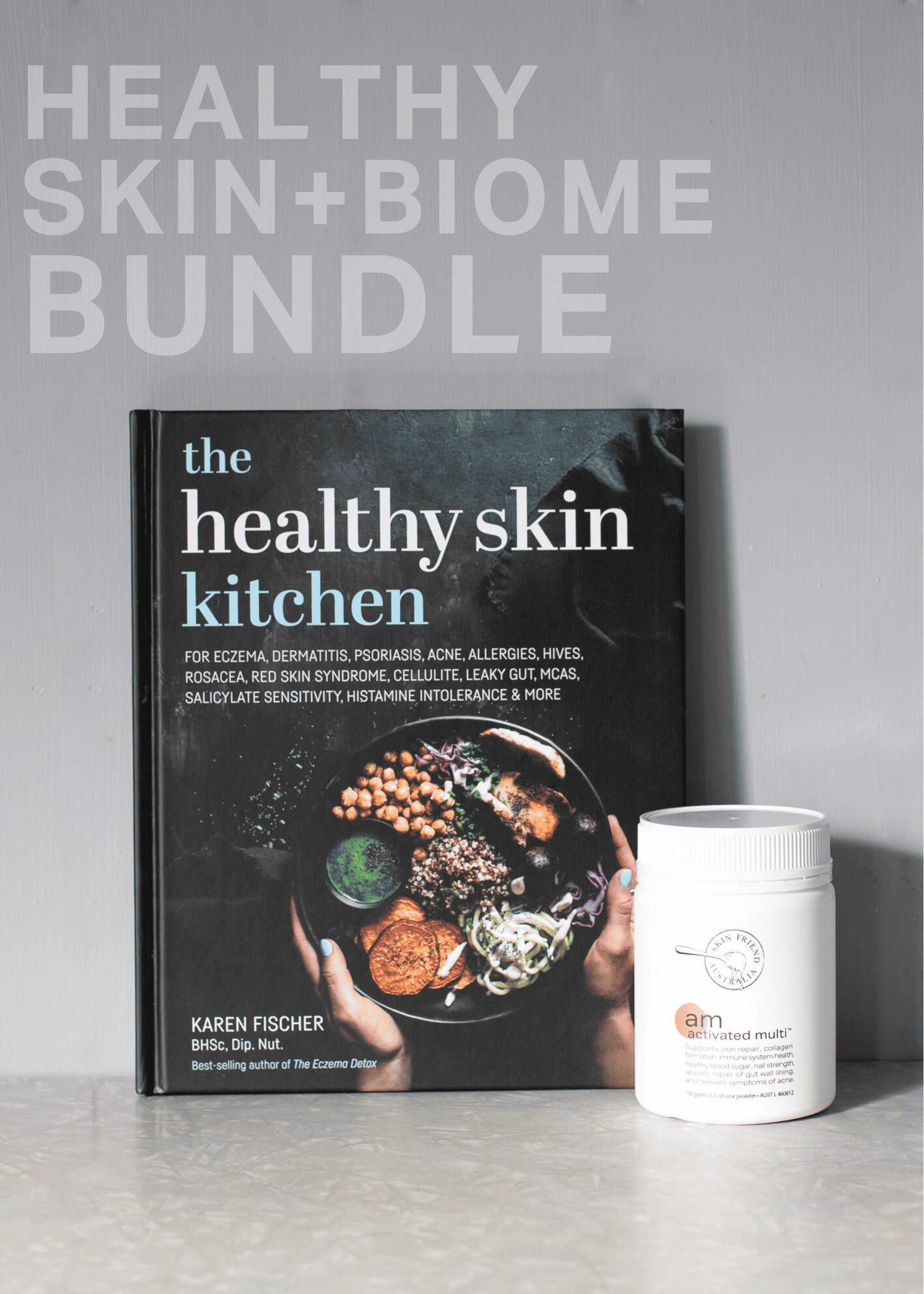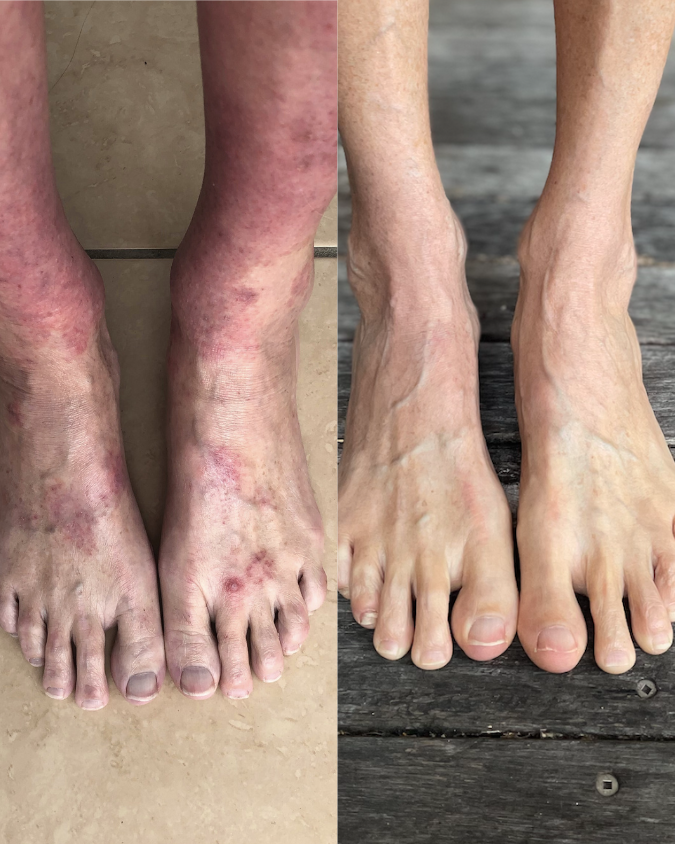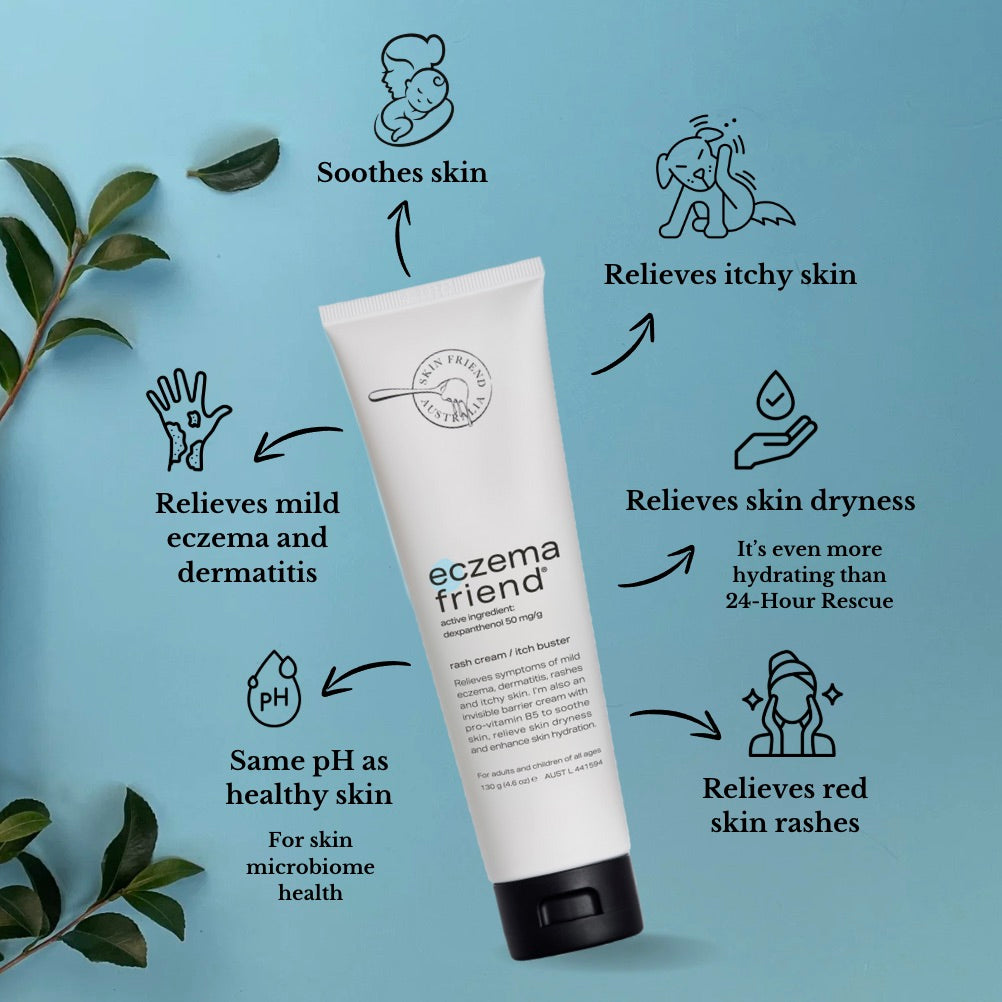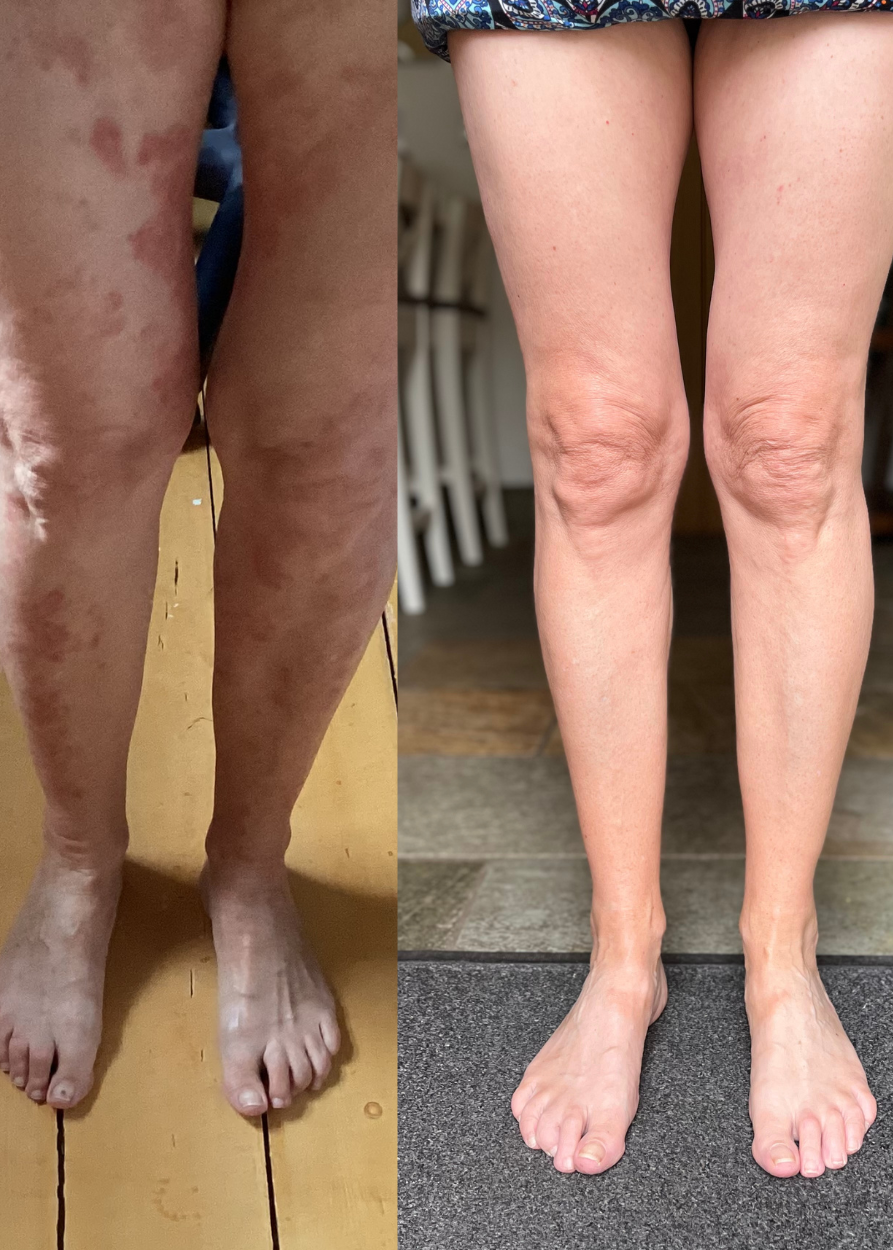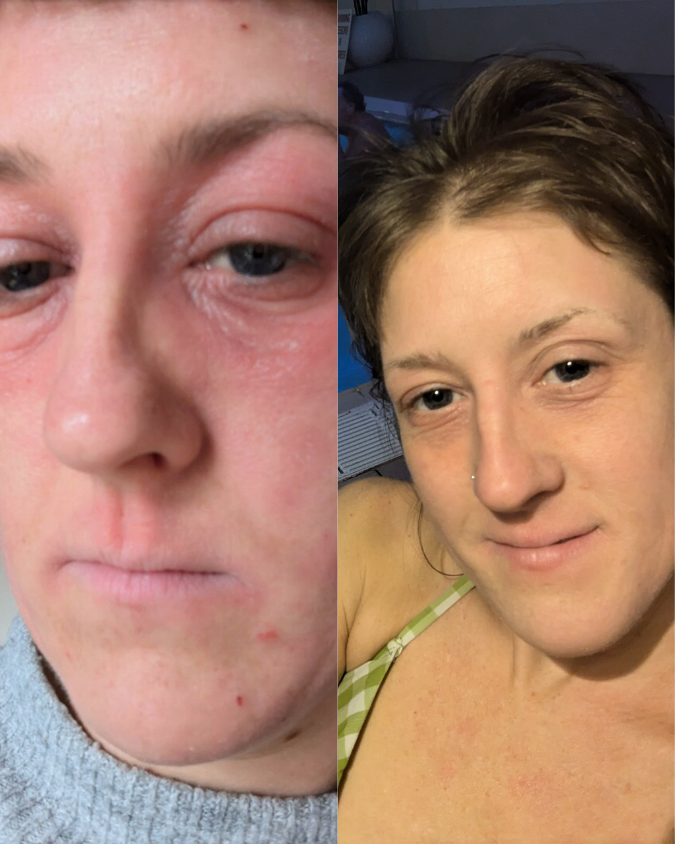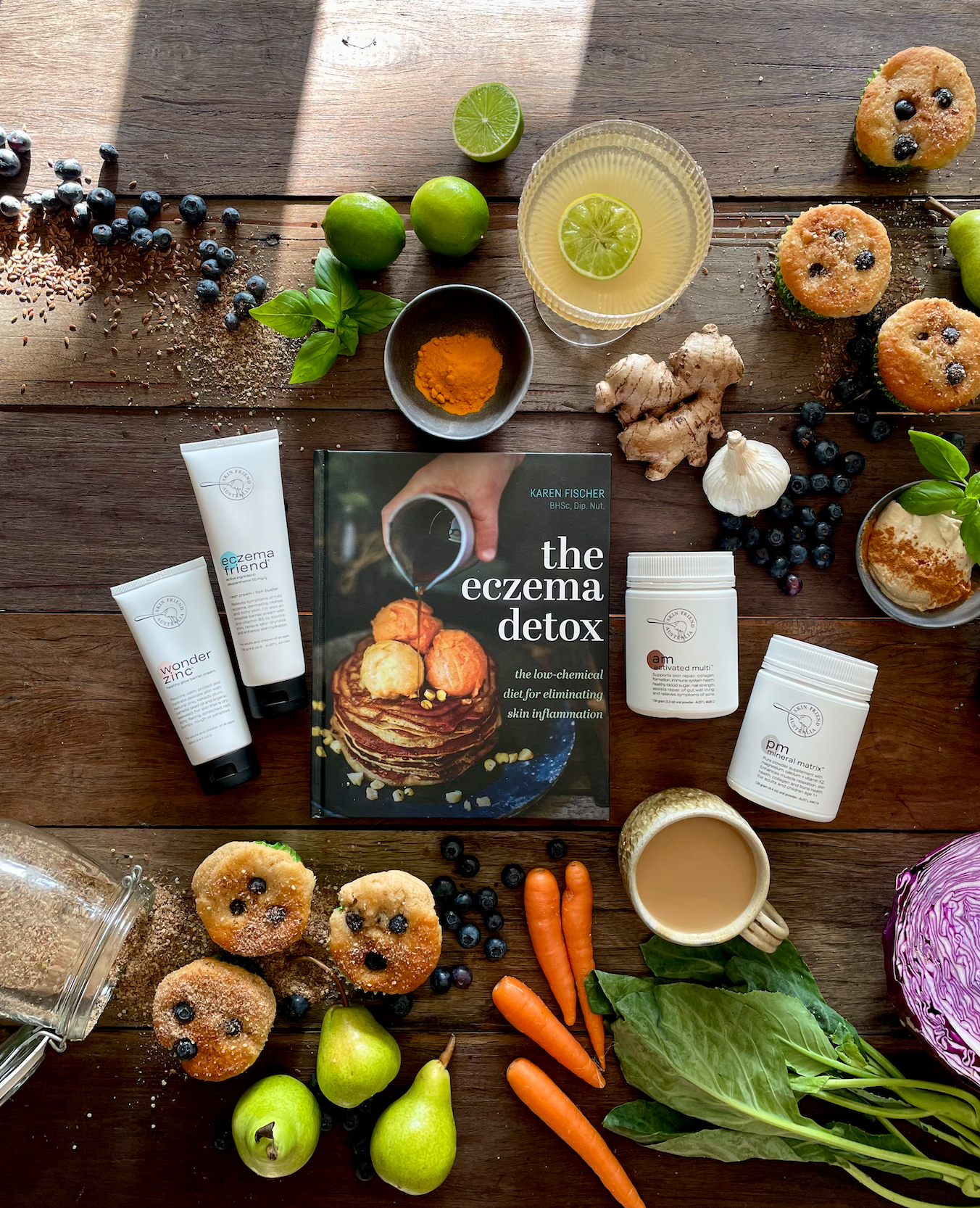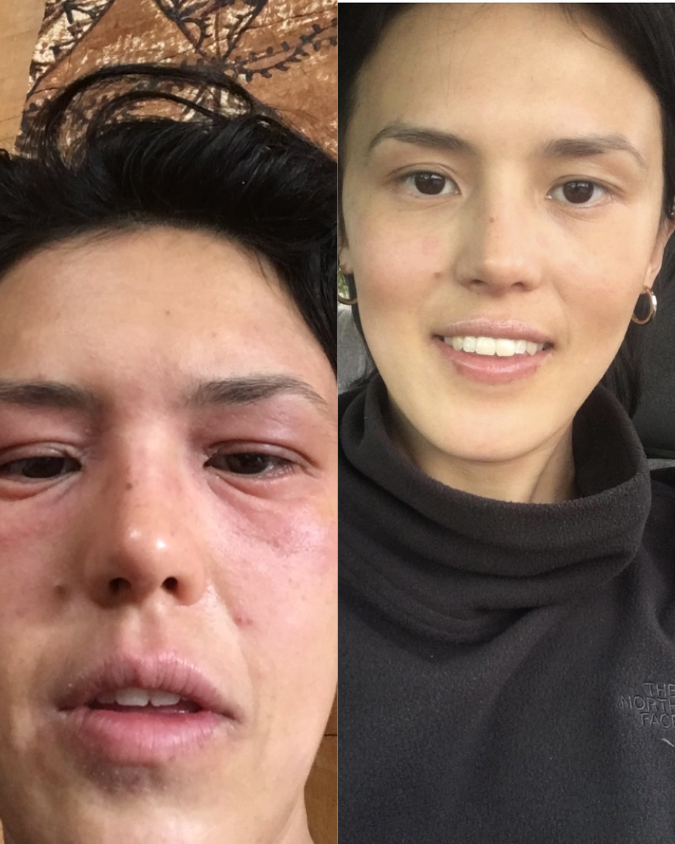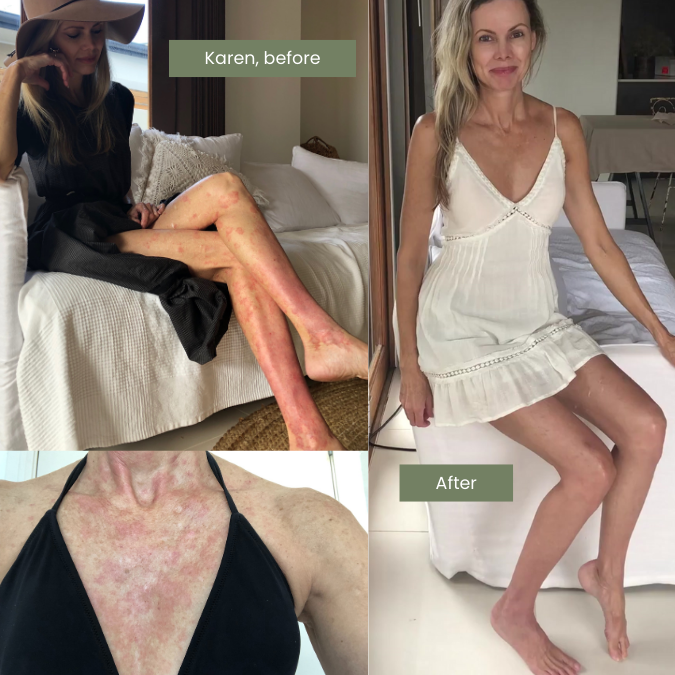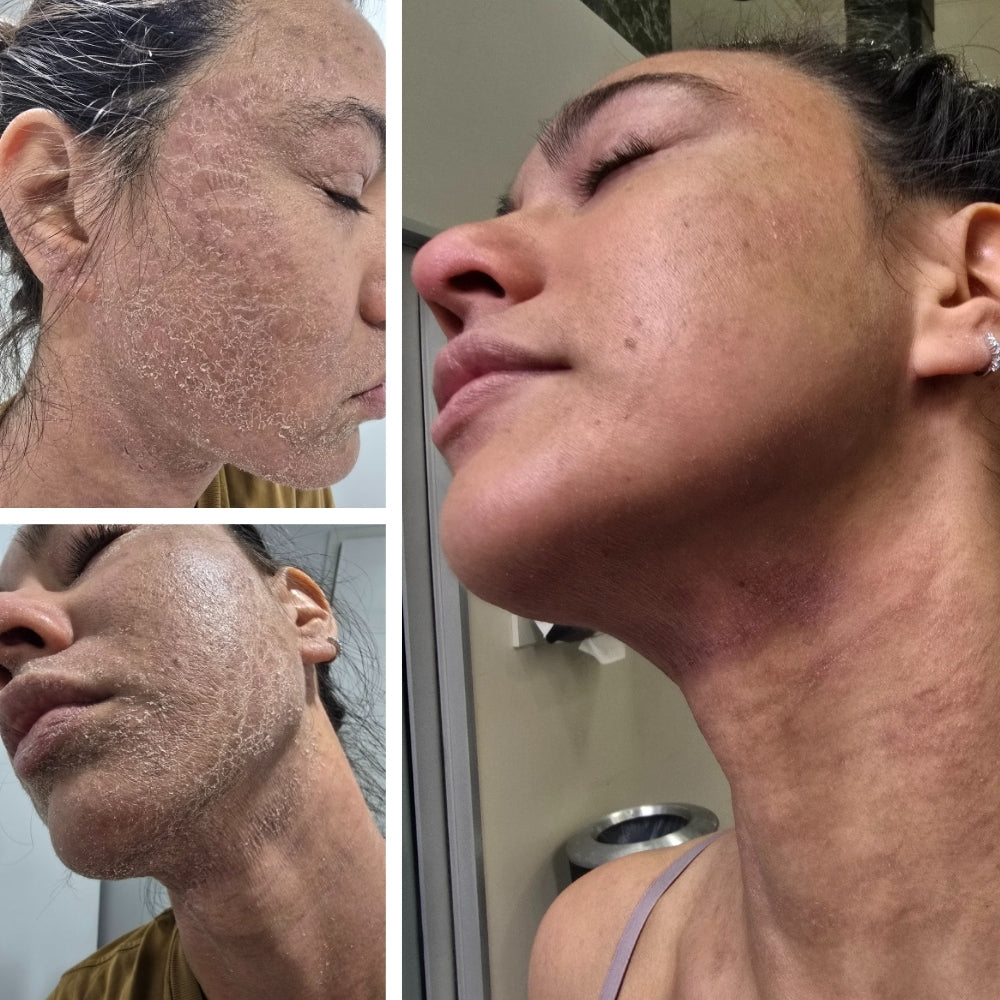These days, skin problems are on the rise — possibly because our foods contain less nutrients and we’ve drifted away from tested and proven skin nutrients in favour of flashy fads like collagen powders and trendy probiotics for "gut health".

Image: Nutritionist and author Karen Fischer has spent the past 20 years helping thousands of people naturally manage skin disorders with diet plus Skin Friend AM and PM.
When I checked the research I found something surprising: probiotics can actually promote gut problems in sensitive people. While collagen supplementation may contain unsafe heavy metals (marine collagen can contain arsenic) and it can upset the balance of your gut microbiome and may even lead to liver dysfunction. That's concerning because normal liver function and gut microbiome health are essential for clear, healthy skin and arsenic is harmful, so I no longer recommend probiotics or collagen supplements.
While trends come and go, your skin still needs the essential, science-backed nutrients that truly build strong, healthy skin from within. So let’s start with the obvious must-haves — and then I’ll share the surprise vitamin most people completely overlook.
If you’re a parent of a child with eczema — or you’re struggling with skin problems yourself — getting back to these proven nutrients could make all the difference for calmer, clearer skin.
This blog also has a handy dosage chart, so you know exactly how much to take — for both adults and kids.
What Supplements can I Take to Improve Skin?
1. Vitamin C — for robust skin
Vitamin C might sound obvious, but you’d be amazed how many skin supplements skip this powerhouse — or include too little (or far too much), which can do more harm than good. Getting the right amount really does make all the difference for healthy, glowing skin.
Why does this matter? Without enough vitamin C, your body can’t make stable collagen or heal wounds properly, leaving skin dull, fragile and slow to repair. Follicular hyperkeratosis (bumps on your skin), bleeding gums and fatigue can also occur.
Research also shows vitamin C supplementation can increase filaggrin production, helping skin cells mature properly and promoting more hydrated skin.
What is filaggrin and is it linked to eczema?
Filaggrin acts like glue for your skin cells, holding them together to lock in moisture and protect you from irritants. Filaggrin gene defects are associated with an increased risk of atopic eczema, allergic sensitisation, allergic rhinitis (hay fever), and dry skin — so vitamin C really could be your skin’s best friend.
How Do You Know If You Have A Filaggrin Gene Defect?

Image: Hyperlinear palms
People with filaggrin defects and eczema often have hyperlinear palms (more visible lines on the palms of their hands), which can be a sign of inherited skin barrier abnormalities, as shown in an early childhood eczema study. The study identified that children with more pronounced palm lines were more likely to have filaggrin gene mutations and a higher risk of developing eczema and egg allergy.
So vitamin C, which naturally boosts filaggrin production, wound healing and collagen formation, is an important (scientifically backed) nutrient to add to your daily skin regime. That's why Skin Friend AM contains vitamin C — in safe and effective amounts.
How much vitamin C is too much?
We’re occasionally asked why we don’t use a higher dose of vitamin C in Skin Friend AM. It’s because in high doses, vitamin C can actually flip from being a helpful antioxidant to acting like a pro-oxidant — and it can even contribute to metabolic acidosis (which is linked to lead to various chronic diseases). This is definitely not what your skin needs. So don’t overdo it. Check the dosage table below to see how much vitamin C is ideal for healthy, resilient skin.
2. Nicotinamide (Vitamin B3) — the skin barrier booster
What causes rough skin? Pellagra — a condition caused by B3 deficiency — is a textbook example of what happens when your skin can’t get enough vitamin B3: rough skin and even scaly dermatitis that just won’t heal. Nicotinamide is a gentle-on-gut form of vitamin B3 that supports your skin and keeps roughness at bay.
Vitamin B3 deficiency can also lead to hyperpigmentation and itchy skin lesions — so taking a daily dose of B3 is like an insurance policy to help protect your skin. That’s exactly why you’ll find nicotinamide (B3) in Skin Friend AM.
Why I Avoid High Dose B Vitamin Supplements
We’re sometimes asked why the B vitamins in Skin Friend AM are lower than in most multivitamins. While vitamin B3 is essential for healthy skin, research shows that taking too much can use up your body’s methyl groups and disrupt how you break down serotonin and histamine — which matters if you have skin issues or histamine intolerance. It’s best to avoid mega-dosing and keep your daily B3 under 20 mg. Check the dosage table below for what you really need for healthy skin.
3. Biotin — for a resilient skin barrier
Biotin’s often hailed as a hair hero, but it’s just as important for your skin. It's an essential coenzyme that helps your body make skin-softening fatty acids and energy, which indirectly supports healthy skin, hair and nails.
True deficiency is rare, but it can occur from genetic factors or "egg white injury" — eating too many raw egg whites (ie consuming daily egg protein shakes, certain dips and chocolate mousse). So check ingredient labels and avoid dips, mayonnaise, aioli and other products that contain "whole egg", as they may sabotage your skin.

Image: Frequent consumption of raw egg whites can cause biotin deficiency and skin problems.
Biotin deficiency is linked to thinning hair, seborrheic dermatitis and scaly skin rashes around the eyes, nose and mouth as well as immune system problems. Small studies show these rashes often clear up quickly with biotin supplementation, which is why we included biotin in our skin and gut formula, Skin Friend AM.
4 & 5. Vitamin B2 & Vitamin B6 — collagen’s quiet partners
Often overlooked, B2 (riboflavin) and B6 (pyridoxine) are vital for collagen production and deficiencies can lead to skin lesions. So any good skin supplement should include these unsung heroes to help keep skin healthy and resilient.
Source: Impaired collagen maturity in vitamins B2 and B6 deficiency—Probable molecular basis of skin lesions.
Methyl Bs Are Better
Some people struggle to process B vitamins properly because of methylation issues, such as an MTHFR gene mutations. Methylation is how your body activates nutrients so they can repair skin and calm inflammation. That’s why I recommend riboflavin sodium phosphate and pyridoxal-5-phosphate — the active, methylated forms of B2 and B6 — so your body can actually use them.
Why This Matters for Your Skin
Activated B vitamins support healthy methylation, which helps to regulate genes linked to skin repair, inflammation and immune balance. That's why Skin Friend AM includes activated B2 and B6.
6. Zinc — to support skin and your gut
Zinc is a true multitasker. It speeds up wound healing, helps calm inflamed skin and even helps to repair the gut wall lining as it's necessary for intestinal barrier function, according to research. If you’ve got lingering skin issues or signs of leaky gut, take zinc while eating a healthy, anti-inflammatory diet.
Find out how to safely supplement with zinc, in the table below.
Image: Oysters are a rich source of zinc
7. Vitamin B5 (Pantothenic Acid) — hydration plus healthy skin cell turnover
Vitamin B5 (pantothenic acid) is one of those quiet heroes your skin loves but rarely gets enough of. When your body runs low on B5, your skin cells don’t renew properly and collagen production can drop, slowing healing and leaving skin dry and easily irritated. Getting enough B5 through your diet — or a quality supplement like Skin Friend AM — helps to keep your skin’s natural repair process humming along, so it stays clear, calm and resilient.
8. Surprise star: Vitamin K2 (Menaquinone-7) — the new skin hero
Most people think vitamin K2 is just for bones, but it’s quietly important for skin too. K2 helps with wound healing and might protect your gut lining according to research, which showed how menaquinone-7 (a potent form of K2), helped to protect the gut biome during antibiotic use.
Since your gut and skin work hand in hand, menaquinone-7 is one extra nutrient I always include — you’ll find it in Skin Friend PM — to support skin health and general health and wellbeing, from the inside out.
Final thoughts: Feeding Your Skin From The Inside Out
Your skin is a reflection of what’s happening deeper inside. With proven, science-backed nutrition, you’re not just supporting your skin — you’re helping your gut, your liver and your whole body stay balanced. Give your skin the building blocks it needs, without the hype — so you can feel confident and comfortable in your own skin.
Which Supplement is Best for your Skin?
This is what I recommend for healthy skin — no hype, just the essentials. Skin Friend AM provides 16 active nutrients including vitamins (B2, B5, B6, biotin, vitamin C) and minerals (zinc and silica) to support your skin, gut and body as a whole. And PM is your daily cup of calm with menaquinone-7 (K2) plus calming minerals (magnesium and calcium). If you’d like to learn more, you can find all the details here on our website.

Together, these nutrients support healthy skin, hair and nails and even help repair the gut wall lining, so your skin gets what it really needs to glow, repair, rebuild and stay strong — long after your morning smoothie.
Optimal, Safe Dosages of Vitamins & Minerals For Healthy Skin
| NUTRIENT |
ADULT DOSE |
CHILD DOSE AGE 1-4 |
CHILD DOSE AGE 5-16 |
BENEFITS |
| Ascorbic Acid (Vitamin C) |
40 to 100mg |
15 to 30mg |
30 to 100mg |
Supports collagen formation, elastin & wound healing, antioxidant, may increase ceramide production, profilaggrin & filaggrin
|
| Nicotinamide (Vitamin B3) |
14 to 16mg |
5 to 6mg |
9 to 16mg |
Prevention of skin disease pellagra (linked to dermatitis); |
| Riboflavin (Vitamin B2) |
1.3 to 3mg |
0.5 to 1mg |
1 to 2mg |
Supports collagen formation; deficiency can lead to seborrheic dermatitis, cracked corners of mouth and tongue inflammation
|
| Biotin |
30 to 100 micrograms (ug) |
8 to 30ug |
12 to 60ug |
Supports healthy hair, skin and nails |
| Pyridoxine (Vitamin B6) |
6mg |
2mg |
4mg |
Supports nervous system function and skin health, deficiency can cause seborrheic dermatitis |
| Zinc |
5mg |
10mg |
15mg |
Supports healthy immune system function, supports skin health and wound healing, reduces pimples and assists the repair of the gut wall lining |
| Pantothenic Acid (Vitamin B5) |
7.5mg |
2.5mg |
5mg |
Supports collagen production, may reduce acne, energy levels, and healthy growth and development in children |
| Menaquinone-7 (Vitamin K2) |
60ug |
30ug |
30 to 60ug |
May protect the gut microbiome during antibiotic use, supports bone health and heart health. |
Click to see References
Pasonen-Seppänen S, et al., Vitamin C enhances differentiation of a continuous keratinocyte cell line (REK) into epidermis with normal stratum corneum ultrastructure and functional permeability barrier. Histochem Cell Biol. 2001 Oct;116(4):287-97. doi: 10.1007/s004180100312. PMID: 11702187.
Ponec M., et al. The formation of competent barrier lipids in reconstructed human epidermis requires the presence of vitamin C. J. Investig. Dermatol. 1997;109:348–355. doi: 10.1111/1523-1747.ep12336024.
McLean WH. Filaggrin failure - from ichthyosis vulgaris to atopic eczema and beyond. Br J Dermatol. 2016 Oct;175 Suppl 2(Suppl Suppl 2):4-7. doi: 10.1111/bjd.14997. PMID: 27667308; PMCID: PMC5053269.
Fukuie T, et al. Palmar hyperlinearity in early childhood atopic dermatitis is associated with filaggrin mutation and sensitization to egg. Pediatr Dermatol. 2019 Mar;36(2):213-218. doi: 10.1111/pde.13752.
Bjorn R T, et al., Deep palmar phenotyping in atopic eczema: patterns associated with filaggrin variants, disease severity and barrier function in a South Asian population, British Journal of Dermatology, Volume 188, Issue 6, June 2023, Pages 785–792, https://doi.org/10.1093/bjd/ljad036
Tian, Y.-J., et al. (2013). Excess nicotinamide increases plasma serotonin and histamine levels. Sheng Li Xue Bao (Acta Physiologica Sinica), 65, 33–38.
Camillo L, Zavattaro E, Savoia P. Nicotinamide: A Multifaceted Molecule in Skin Health and Beyond. Medicina (Kaunas). 2025 Feb 1;61(2):254. doi: 10.3390/medicina61020254.
Savvidou S. Pellagra: a non-eradicated old disease. Clin Pract. 2014 Apr 28;4(1):637. doi: 10.4081/cp.2014.637.
Brenner S, Horwitz C. Possible nutrient mediators in psoriasis and seborrheic dermatitis. II. Nutrient mediators: essential fatty acids; vitamins A, E and D; vitamins B1, B2, B6, niacin and biotin; vitamin C selenium; zinc; iron. World Rev Nutr Diet. 1988;55:165-82.
Pirie, N. W., et al. (1983). Effect of riboflavin and pyridoxine deficiency on collagen biosynthesis in the chick embryo. Biochimica et Biophysica Acta (BBA) - Protein Structure and Molecular Enzymology, 747(1), 108–112. https://doi.org/10.1016/0006-2944(83)90025-X
Arribas Lopez, E., et al. (2025). Systematic review and meta-analysis of the effect of zinc on wound healing. BMJ Nutrition, Prevention & Health, 8.
Miyoshi Y., Tanabe S., Suzuki T. Cellular zinc is required for intestinal epithelial barrier maintenance via the regulation of claudin-3 and occludin expression. Am. J. Physiol. Gastrointest. Liver Physiol. 2016;311:G105–G116. doi: 10.1152/ajpgi.00405.2015.
Kobayashi, Y., et al. (2011). Effect of pantothenic acid on the proliferation and differentiation of human skin cells in vitro. Journal of Pharmacological Sciences, 115(2), 230–234. https://doi.org/10.1254/jphs.10224SC









